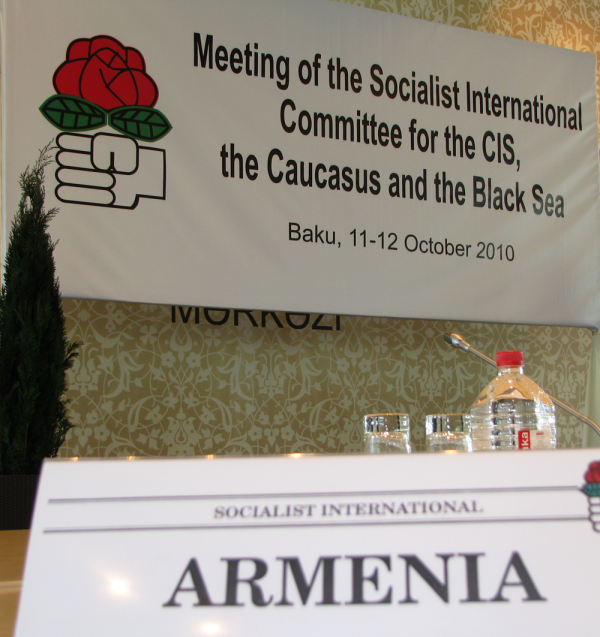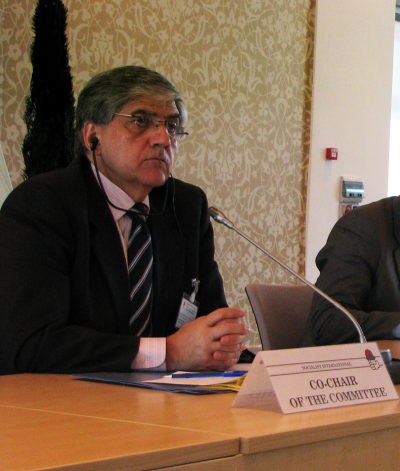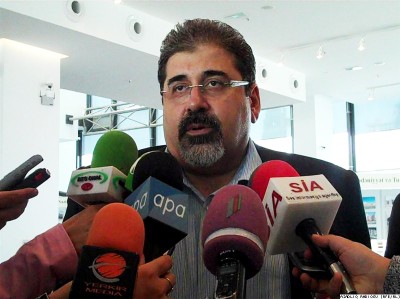On Monday, 11 and Tuesday, 12 October, 2010, ARF-D Bureau member and Co-Chair of the SI Committee Mario Nalbandian (Nalpatian) and Director of the ARF-D Bureau’s International Secretariat Giro Manoyan took part in the meeting of the Socialist International Committee for the CIS, the Caucasus and the Black Sea, in Baku, Azerbaijan hosted by SI member the Social Democratic Party of Azerbaijan (SDPA). This was the first ever ARF-Dashnaktsutyun delegation visiting Baku in over nine decades.
The agenda for the meeting included discussions on (1) Peace and Security in the region; (2) Brief reports on the national situation in countries of the region; (3) Forthcoming elections and opportunities for social democracy.
Also taking part in the meeting were representatives of parties from Azerbaijan, Belarus, Georgia, Greece, Hungary, Kazakhstan, Kyrgyzstan, Moldova, the Russian Federation, Sweden and Ukraine. It was anticipated that representatives of Turkey’s CHP party would participate in the SI committee meeting in Baku, however, they were absent just as they were during the committee’s previous meetings in Geneva and Yerevan.
Socialist International Secretary General Luis Ayala opened the meeting and invited Vugar Aliyev from the Azerbaijani President’s administration to deliver his welcoming message. Luis Ayala stressed the importance of resolving the conflicts in Mountainous Karabakh and elsewhere in the volatile region as he opened the forum. He said the SI could contribute to regional peace by facilitating dialogue between the conflicting parties. Vugar Aliyev said Azerbaijan has developed; the poverty level has dropped from 49 percent to 11 percent. He said there are 54 political parties in the country.
Afterwards, the opening session of the meeting was temporarily halted as the committee’s co-chair Mario Nalbandian was delayed at the Baku airport because “visa problems had emerged.” Once those issues were resolved, the Armenian delegation was finally able to get to the meeting venue. Later, during the meeting, the representative of the Social Democratic Party of Azerbaijan assumed responsibility, saying that the problem was a “technical mistake.” In Yerevan, ARF-D member and Vice-president of the Socialist International Maria Titizian said the ARF-D delegation did not face a problem at Baku airport, but as Mario Nalbandian is a citizen of Argentina the solution of the visa problem took some time.
A group of members of the Azerbaijani Karabakh Liberation Organization had attempted to picket outside Baku Business Center, where the SI Committee meeting was being held. The picketers protested against the arrival of the ARF-Dashnaktsutyun delegation in Azerbaijan. Before the arrival of the Armenian delegation, the police had dispersed the picket. Two of the protesters who had entered the meeting venue were detained for a short while.
Before the meeting resumed, a large number of reporters from the Azerbaijani media were mainly interested to know about the ARF-Dashnaktsutyun’s position on issues related to the Karabakh conflict and Armenian-Turkish relations. Responding to the media’s questions, Giro Manoyan said that the protocols between Turkey and Armenia have not been ratified because Ankara put the settlement of the Mountainous Karabakh conflict as the main condition. He expressed hope that Turkey and Armenia will establish a dialogue in the future. “Turkey must abandon any preconditions to establish diplomatic relations between Ankara and Yerevan. Otherwise, it will be impossible to establish diplomatic and other relations between the parties,” Manoyan said.
Speaking of the importance of having the SI committee meetings in Yerevan, in June 2010 and now in Baku, Manoyan said they are important, because they help to establish trust between the civil societies of Armenia and Azerbaijan. He said that both countries negotiate to resolve the Mountainous Karabakh conflict, but it is necessary to create an atmosphere of trust between civil societies of both countries to achieve success.
Regarding Azerbaijani army warrant officer Mubariz Ibrahimov’s corpse, — died along with four Armenian servicemen in June, during an Azerbaijani attack on a Karabakh army outpost in the territory’s northern Martakert district — is in a neutral territory, Manoyan told the journalists. “The body is not on the Karabakh side, it is in a neutral zone, and Azerbaijan can go and retrieve it,” said Manoyan. Manoyan said security of this process was a responsibility of the International Committee of the Red Cross, “which in this case has failed its mission, just as it failed its mission when it could not visit the Armenian sheppard Manvel Saribekyan,” 20, who had accidentally strayed into Azerbaijani territory while grazing cattle in northeastern Armenia close to the Azerbaijani border.
During the meeting, presenting the ARF-Dashnaktustyun’s position on the Karabakh conflict, Nalbandian and Manoyan reaffirmed their party’s strong opposition to any settlement that would place Karabakh back under Azerbaijani control. They noted that Azerbaijan is displeased by the OSCE Minsk Group co-chairs’ proposals regarding a peaceful settlement, because they do not foresee the possibility of Karabakh being forced back to within Azerbaijan’s structure. They also stressed that Karabakh was never a part of an independent Azerbaijan.
Manoyan also said that democratization of the political systems of Armenia, Azerbaijan, and Georgia would facilitate the resolution of this and other regional conflicts. “Democracy in each country will help resolve the conflicts,” he said.
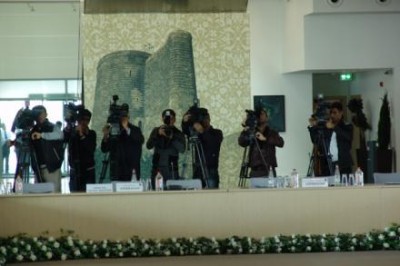
Azerbaijani news outlets distorted some of Giro Manoyan’s statements; in particular that he apparently characterized the Karabakh conflict as one between Azerbaijan and Armenia. In all his statements and during all interviews, Manoyan clearly stated that the conflict was and continues to be between Karabakh and Azerbaijan; Armenia assists in defending Karabakh and its interests, but can not replace it in all aspects. Hence, the necessity to have the Mountainous Karabakh Republic as a full-fledged negotiating party, just as it has signed the ceasefire of 1994. During the meeting and in answering the Azerbaijani media’s questions, Manoyan stressed that Armenia de facto recognizes the Mountainous Karabakh Republic by having signed economic and other agreements with it.
All those who spoke during the session stressed the importance of this meeting and the meeting, which took place in Yerevan in June where representatives of Armenian and Azerbaijani political parties had the opportunity for dialogue. They stressed the necessity to find a peaceful resolution to the conflict.
The Secretary General of the Socialist International, Luis Ayala, welcomed the discussion between the two sides and summarizing the results of the discussion attached great importance to the meetings of the committee and expressed hope that, although there are disagreements and the positions of the sides are still far apart, Armenians and Azerbaijanis can come to an agreement that will contribute to the strengthening of peace and stability in the region. Towards that purpose, the Secretary General asked the Armenian and Azerbaijani parties to provide the SI Secretariat with their respective positions on a set of principles for the peaceful settlement of the Mountainous Karabakh conflict; the Secretariat and the co-chairs of the committee would work to bring those positions closer, in order to be able to present a common set of principles to the SI Council meeting in mid-November, in Paris.
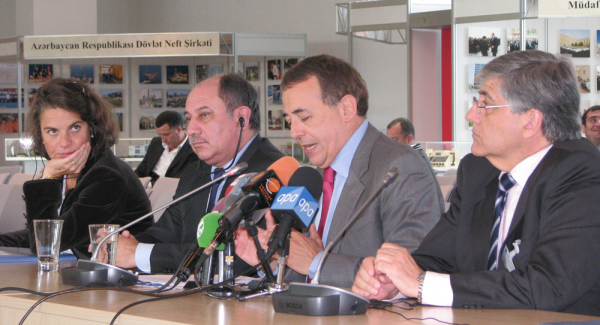
During the press conference following the SI Committee meeting, the Co-chairs of the Committee, the Co-chair of the ASDP and the SI Secretary General
The Committee also heard country reports from the parties of the region. Speaking about the situation in Armenia, Giro Manoyan informed the meeting that even though the parliamentary elections are to be held in 2012, but all major political parties are gearing up for them. He spoke about the party’s efforts, along with the other parliamentary opposition party, to reform the country’s electoral code. Presenting the situation in the country, Manoyan repeated what the party representative had said at the Committee’s meeting in Yerevan, that the political system in Armenia is an oligopoly, where the political and economic elites have become the same, with monopolistic privileges, serving the economic interests of a few. Regarding Armenia-Turkey negotiations to establish diplomatic relations, Manoyan said that the ARF-D is calling on the Armenian government to recall its signature from the protocols signed a year ago in Zurich.
Back in Yerevan, during a press conference on October 13, Mario Nalbandian and Giro Manoyan evaluated the ARF-D delegation’s participation in the meeting as effective. Nalbandian commented that the Armenian delegation was duly received in Baku, with necessary security measures taken. “Except for my visa problems, which made us stay at the airport for five hours, it was all right,” Nalbandian said. Commenting on his TV debate with Araz Alizadeh, co-chair of the Azerbaijani Social Democratic Party, Giro Manoyan pointed out that the Azerbaijani politician used the TV debate for election campaign purposes. “He was talking pure nonsense, and I did not even want – but had – to respond. For example, Alizadeh was saying that Akhtamar is just an Armenian brandy. Or, he claimed, that fewer Armenians are living in Mountainous Karabakh now than before its independence,” Manoyan said.
A couple of days after the SI Committee meeting in Baku, EU Permanent Representative in Azerbaijan Roland Kobia stated that “The European Union welcomes contacts between the Azerbaijani and Armenian political forces,” commenting on the meeting of Azerbaijani and Armenian political forces at the Socialist International conference in Baku. According to him, it is necessary to use every opportunity for the dialogue. “ We are working for mutual confidence and contacts. We consider that only dialogue could lead to the solution of the problem,” the EU official said.
Asked to comment on the Azerbaijani government’s decision to allow the two ARF representatives to travel to Baku, the ruling Yeni Azerbaijan Party Executive Secretary Ali Ahmadov described the decision as part of a public diplomacy campaign. “Azerbaijan uses different ways to achieve the return of its occupied territories. For this purpose, all necessary steps could be used,” Ahmadov told an October 13 news conference. Visits by Armenian politicians are made “possible if it serves to facilitate the liberation of the occupied territory,” he said. Ahmadov did not elaborate how the trip by the ARF-D delegation served this purpose.
The ARF-Dashnaktsutyun rejoined the Socialist International in September 1996, which it had originally joined in 1907. In 2003, the ARF-D became a full member of the Socialist International, thus becoming the only party in the CIS with such a status.
During the XXIII Congress of the Socialist International in Athens, June 2008, ARF-D representative Maria Titizian was elected vice-president of the organization.
The SI Council in Mexico, November 2008, elected ARF-D Bureau member Mario Nalpatian as co-chair of the SI Committee for the CIS, the Caucasus and the Black Sea.
The ARF-D Women’s Group is a member of the SIW (Socialist International Women) and the youth organization of the ARF-D, the Armenian Youth Federation, is a full member of the IUSY (International Union of Socialist Youth) and an observer member of the ECOSY (European Community Organization of Socialist Youth).
* * *
SI Official Press Release
Focus on Mountainous Karabakh conflict at meeting in Baku of SI Committee for the CIS, the Caucasus and the Black Sea
11-12 OCTOBER 2010
Following on from its previous meeting held in Yerevan in June this year, the Socialist International held a meeting of its Committee for the CIS, Caucasus and Black Sea in Baku on 11-12 October 2010, focusing primarily on the unresolved conflict between Armenia and Azerbaijan, and on ways in which the International can contribute towards peace and security both between these two countries and in the region as a whole.
On a prior visit to Azerbaijan, the SI Secretary General met with the President of the Republic, Ilham Aliyev, to whom he proposed the holding of a meeting in Baku with the participation of delegates from Armenia to foster political dialogue on peace and security. The President agreed and supported this initiative, resulting in the first visit by a political delegation from Armenia to the country since the ceasefire of May 1994 and the first by members of the Dashnaktsutiun party for nearly a century. The President’s Administration was later represented at the meeting in Baku.
The courage of both the Azerbaijanis and the Armenians in taking this historic step in Baku was underlined by the SI Secretary General, highlighting the urgent need to move forward a process for peace and unblock the stalemate in existence since the ceasefire was agreed. While it was clear that peace was a process that could ultimately only be built by the parties directly involved in the conflict, the role of politics and political parties was crucial in fomenting a culture of dialogue, of moving away from entrenched positions and achieving a sustainable solution.
The Committee’s debates, which were widely covered by the media not only in Azerbaijan and Armenia but also in the region as a whole, included extensive exchanges between the delegations from the Social Democratic Party of Azerbaijan and the Dashnaktsutiun Party of Armenia, both members of the Socialist International, and contributions by representatives of fraternal parties from countries of the CIS and the Caucasus, as well as from other SI members. (List of Participants)
At the conclusion of the debate on this subject, all agreed on the importance of building and maintaining a momentum and a dynamic towards reaching an early resolution to this conflict which has affected these two nations for so long and cost the lives of tens of thousands. As a contribution to this end, it was agreed that an outline of common principles incorporating areas of mutual agreement should be drawn up by the SI Secretary General from proposals to be presented by the parties to the conflict, for subsequent approval by the Council at its forthcoming meeting in Paris on 15-16 November.
The Committee went on to address wider issues of peace and security in the region as a whole and received reports on the national situations and electoral processes in countries of the region by the respective delegations.
Common threads affecting the whole region emerged, not least the challenge of strengthening democracy to achieve more inclusive societies with full rights and freedoms. Social problems and poverty as the cause of the underlying instability that existed in many states of the region was highlighted, and it was believed that solutions to these issues would contribute toward resolving the longstanding conflicts which persisted in a number of countries.
Participants emphasised the need to respond to the desire of the people of the region for peace, fully-functioning democratic institutions, social justice and economic progress. As social democrats, all were committed to working together to that end.
The Committee agreed that the next meeting would take place in Kazakhstan in the first part of 2011, where these crucial questions would continue to be a focus of discussion, with a particular emphasis on the Central Asian countries of the CIS as well as the situation of Georgia.

